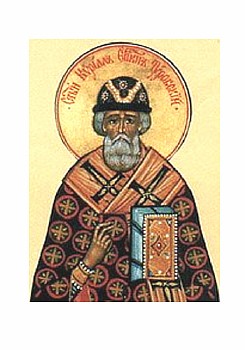|
- - - -
Kirill Of Turov
KIRILL OF TUROV
(circa 1113 – after 1190)
Church figure of the East Slavs, theologian, preacher; first-rate Old Russian religious thinker and writer
Kirill of Turov was born in the village of Turov, Zhitkovichi district of Gomel region. Approximately in 1123, he took the monastic vows, was a father superior of Nykolsky cloister of Turov in 1144–1148. In the end of 1140s he became an inclusus, edited and adapted Greek prayer and reader books for the church purposes. He was the first monk of the East Slavs who accomplish a feat of pillar asceticism: the theologian locked himself up in a wooden tower near the monastery in order to abandon himself to prayers. In 1161–1177, he was the bishop of Turov. He is the author of sermons, prayers, homilies, parables and canons, created on the model of antique and Byzantine oratorical prose. The heriage he left contains approximately 70 works. The ceremonial “words” which he wrote on account of religious celebrations brought to him especial fame. The “words” were notable for their refined Old Church Slavonic language, figurativeness, lyricism, sublimity and emotionality. In his works Kirill of Turov dealt with vital mental and ethical problems, important issues of socio-political life. He considered a man to be a principal figure of the universe, crown of creation. The theologian developed a teaching about a “harmonious mind” – a spiritual state when a person achieves harmony between thinking and faith. He condemned slander, resentment, pride, envy, anger, violence, avarice, bribery, ribaldry, rancor and other human vices. Being noted for his scholarship and knowledges in the sphere of Greek hortative literature, Kirill of Turov is considered to be one of the greatest Old Russian religious thinker, writer and orator of the XII century. For centuries his works enjoyed wide popularity and authority on the land of the East Slavs; they were included in manuscripts along with the works of famous Byzantine preachers and theologians. The contemporaries called the bishop “The greatest Chrysostom of all the Russia”. The last years of his life the theologian spent in the Episcopal Cloister of Sts. Boris and Gleb. He died in Turov. In 1984, the bishop was canonized.
Труды:
1. Творения иже во святых отца нашего Кирилла, епископа Туровского. Киев, 1880.
Литература:
1. Еремин И. П. Литературное наследие Кирилла Туровского // Труды Отдела древнерусской литературы Института русской литературы АН СССР. 1955. Т. XI. С. 342–367; 1956. Т. XII. С. 340–361.
2. Nadson A. Sрiritual Writings of St. Сyril of Turau // Easterm churches review. 1967–1968. Vol. 1. No. 4. P. 347–358.
3. Мельнікаў А. А. Кірыл, епіскап Тураўскі: Жыццё, спадчына, светапогляд. Мінск: Беларуская навука, 2000.

© National Academy of Sciences of Belarus, 2011
|
|


